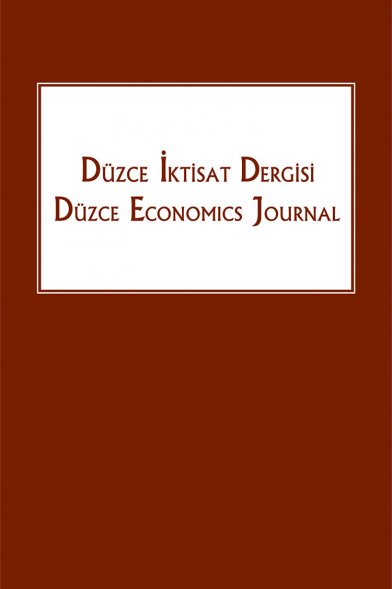Türkiye İçin Cari İşlemler Dengesi Beklentilerinin Rasyonalitesi Üzerine Ekonometrik Bir Analiz
Cari İşlemler Dengesi, Rasyonel Beklentiler Hipotezi, Yansızlık, Etkinlik.
Türkiye İçin Cari İşlemler Dengesi Beklentilerinin Rasyonalitesi Üzerine Ekonometrik Bir Analiz
___
Baillie, R. T., Lippens, R. R. and MacMahon, P. C. (1983). Testing rational expectations and efficiency in the foreign exchange market. Econometrica, 51 (3), 553-563.
Begg, D. K. H. (1982). The rational expectations revolutin in macroeconomics, theories and evidence. Baltimore: The Johns Hopkins University Press.
Bilgili, F. (2001). The unbiasedness and efficiency tests of the rational expectations hypothesis. MPRA, No: 24114.
Carlson, J A. (1977). A study of price forecasts. Annals of Economic. and Social Measurement. 6 (1), 27-56.
Chortareas, G., Jitmaneeroj, B. and Wood, A. (2012). Forecast rationality and monetary policy frameworks: Evidence from UK interest rate forecasts. Journal of International Financial Markets, Institutions & Money. 22, 209-231.
Çavuşoğlu, N. and Neveu, A. R. (2015). The predictive power of survey-based Exchange rate forecasts: Is there a role for dispersion? Journal of Forecating, 34, 337-353.
Frankel, J. A. and Froot, K. A. (1987). Using survey data to test standard propositions regardinge exchange rate expectations. The American Economic Review, 77 (1), 133-153.
Frenkel, M., Mauch, M and Rülke, J. C. (2017). Forecaster rationality and expectation formation in foreign Exchange markets: Do emerging markets differ from industrialized economies? WHU-Otto Beisheim School of Management, Economics Group, WP 17/04.
Friedman, B.M. (1980). Survey evidence on the rationality of interest rate expectations. The Journal of Monetary Economics. 6,453-465.
Froot, K.A. (1989). New hope for the expectations hypothesis of the term structure of interest rates. NBER Working Paper Series, No.2363.
Jonsson, T. and Österholm, P. (2012). The properties of survey-based inflation expectations in Sweden. Emprical Economics. 42, 79-94.
Kara, H. and Küçük-Tuğer, H. (2005). Some Evidence on the (ir)rationality of inflation expectations in Turkey. The Central Bank of the Rebuplic of Turkey. Working Paper, No: 05/12.
Keane, M.P. and Runkle, D.E. (1989). Are economic forecasts rational? Federal Reserve Bank of Minneapolis Ouarterly Review, 13 (2), 26-33.
Kim, S.K. (1997). Testing the rationality of exchange rate and interest rate expectations: an emprical study of Australian survey-based expectations. Applied Economics. 28 (9), 1011-1022..
MacDonald, R. ve MacMillan, P. (1994). On the expectations viewof the term structure, term premia and survey-based expectations. The Economic Journal, 104 (426), 1070-1086.
Miah, F., Khalifa, A.A. and Hammoudeh, S. (2016). Further evidence on rationality of interest rate expectations: a comprehensive study of developed and emerging economies. Economic Modelling, 54, 574-590.
Mullineaux, D.J. (1978). On testing for rationality: another look at the Livingston price expectations data. Journal of Political Economy, 86 (2), 329-336.
Muth, J. (1961). Rational expectations and the theory of price movements. Econometrica. 29 (3), 315-335.
Oral, E. (2002). Inflation expectations derived from business tendency survey of the Central Bank. The Central Bank of the Republic of Turkey Working Paper.
Pesando, J.E. (1975). A note rationality of the Livingston price expectations. Journal of Political Economy, 83 (4), 849-858.
Razzak, W. A. (1997), Testing the rationality of the National Bank of New Zealand’s survey data. Reserve Bank of New Zealand Discussion Paper, 97 (5), 1-24..
Riaz, M. (2012). Forecast analysis of food price inflation in Pakistan: applying rationality criterion for VAR forecast. Developing Countires Studies. 2 (1), 63-72
Simon, D. P. (1989). The rationality of federal funds rate expectations: Evidence from a survey. Journal of Money, Credit, and Banking, 21 (3), 388-393.
Turnovsky, S.J. (1970). Emprical evidence on the formation of price expectations. Journal of American Statistics Association, 65, 1441-1454.
- ISSN: 2757-6558
- Yayın Aralığı: Yılda 2 Sayı
- Başlangıç: 2020
- Yayıncı: Şerif CANBAY
Hisse Senedi Fiyatlarının Ortalamaya Dönüşü: Kesirli Frekanslı Fourier ADF Birim Kök Testi
Kripto Paraların Dünya Genelindeki Hukuki Durumuna İlişkin Bir İnceleme
Türkiye'de Askeri Harcama Yakınsaması: Fourier Birim Kök Testinden Kanıtlar
Türkiye İçin Cari İşlemler Dengesi Beklentilerinin Rasyonalitesi Üzerine Ekonometrik Bir Analiz
